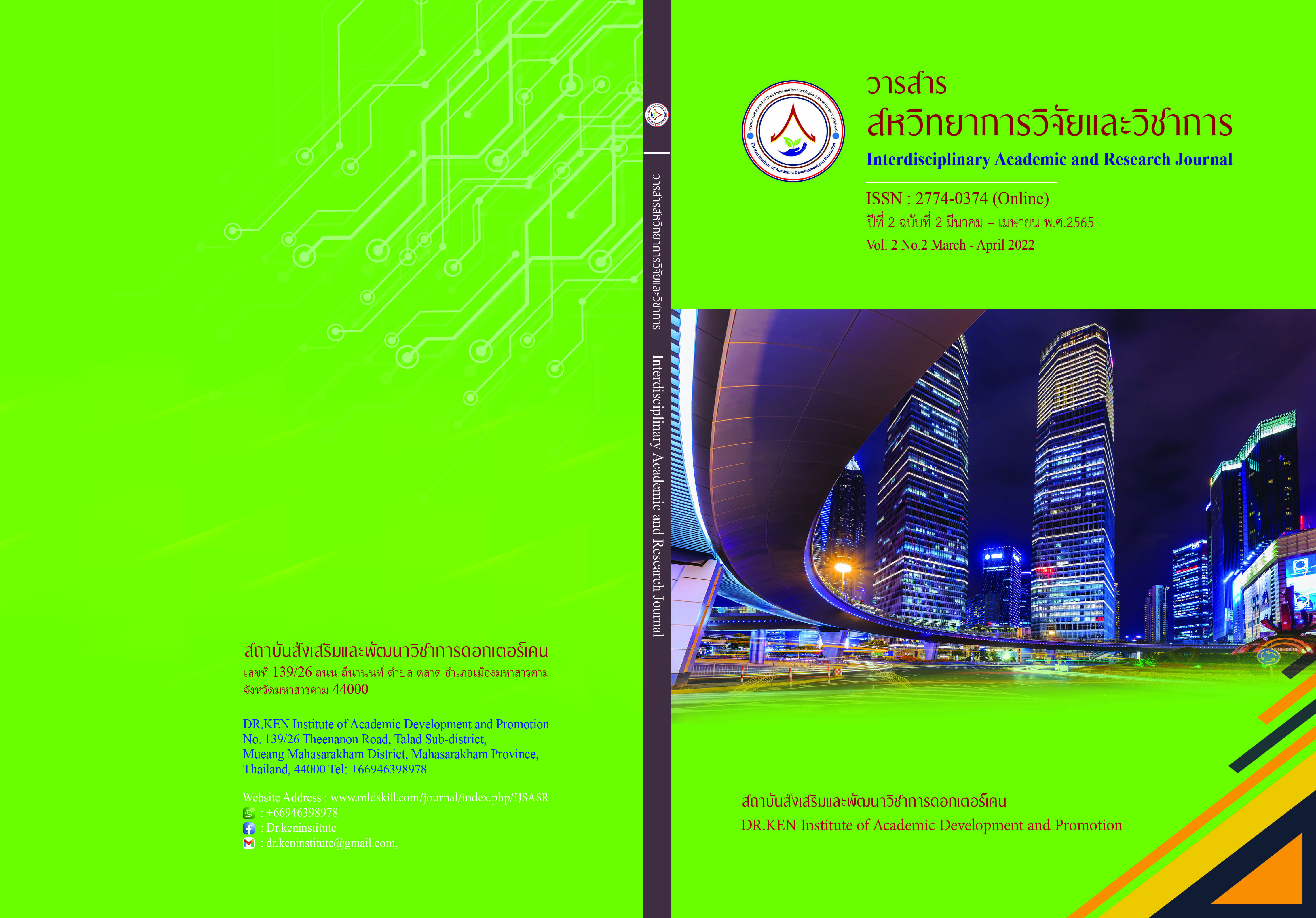The Relationship Between Innovative Leadership and Innovative Organization of Local Government Organizations in the Southern Border Provinces
DOI:
https://doi.org/10.14456/iarj.2022.9Keywords:
Innovative Leadership, , Innovation Organization,, Local Government OrganizationAbstract
Innovation is of great importance and is considered the key to the advancement of the organization and the ability to grow economically and socially. Local management requires innovation as a tool to manage and develop local people to find new approaches and ideas for resource management, in the form of innovative products and process innovation. Organizations with knowledgeable organization leaders are access to knowledge to manage knowledge effectively, the organization is constantly improving and developing. This research is a theoretical approach to innovative leadership. It consists of eight key elements: Morale and barriers to innovation, Sponsorships, and Rewards, Resources, defining boundaries and tasks; creative freedom, innovation development, and teamwork. The results of the study of innovation organization consisted of 4 components: personnel, structure and work processes, technology, and organizational culture.
References
กุลชลี จงเจริญ. (2552). “ภาวะผู้นำและการเปลี่ยนแปลง” ใน ประมวลชุดวิชาการพัฒนาทักษะประสบการณ์วิชาชีพสำหรับผู้นำทางการศึกษา. หน่วยที่ 2 นนทบุรี มหาวิทยาลัยสุโขทัยธรรมาธิราช สาขาศึกษาศาสตร์.
เกสรา ศักดิ์มณีวงศา. (2561). การเตรียมความพร้อมให้กับองค์กรยุคดิจิตอล. กรุงเทพฯ: ดีลอยท์ ทู้ช โธมัทสุ.
จิรพล สังข์โพธิ์, สุวรรณ จันทิวาสารกิจ, และเสาวนีย์ อยู่ดีรัมย์. (2560). ภาวะผู้นำในการบริหารองค์กรยุคดิจิทัล กรณีศึกษา : องค์กรไอทีและองค์กรที่เกี่ยวข้องกับไอทีในเขต กรุงเทพมหานครและปริมณฑล.กรุงเทพมหานคร: วิทยาลัยนวัตกรรม มหาวิทยาลัยธรรมศาสตร์.
จีราภา ประพันธ์พัฒน์. (2560). การศึกษาภาวะผู้นำเชิงนวัตกรรมของผู้บริหารสถานศึกษาตามความคิดเห็นของครูสังกัดสำนักงานเขตพื้นที่การศึกษาประถมศึกษาปทุมธานี. วิทยานิพนธ์การศึกษามหาบัณฑิต. ปทุมธานี: มหาวิทยาลัยเทคโนโลยีราชมงคลธัญบุรี.
ณิชาภา สุนทรไชย. (2561). แนวทางการพัฒนาภาวะผู้นำเชิงนวัตกรรมของผู้บริหารโรงเรียนเอกชนในจังหวัดกาฬสินธุ์. วิทยานิพนธ์ศึกษาศาสตรมหาบัณฑิต: มหาวิทยาลัยขอนแก่น.
ดนัยรัฐ ธนบดีธรรมจารี. (2561). Digital Transformation version 3.4. [Online] สืบค้นเมื่อ 16 มกราคม 2565, จาก https://www.slideshare.net/DanairatThanabodithammachari/
ธนาวิชญ์ จินดาประดิษฐ์. (2561). แนวทางการพัฒนาระบบงานและกระบวนการทำงานสู่การเป็นองค์กร ดิจิทัล เอกสารการอบรมหลักสูตรเร่งรัดเพื่อเตรียมความพร้อมเข้าสู่องค์กรภาครัฐแบบดิจิทัล. [Online] สืบค้นเมื่อ 1 กุมภาพันธ์ 2565, จาก www.opdc.go.th.
เศรษฐพงค์ มะลิสุวรรณ และ วาสนา แก้วผนึกรังษี. (2561). การเปลี่ยนผ่านทางดิจิทัลของประเทศไทย เพื่อนำไปสู่ Thailand 4.0. วารสารวิชาการ กสทช, บทความพิเศษ, 24 – 42.
สมศักดิ์ วานิชยาภรณ์ และนิสรา ใจซื่อ. (2562). การขับเคลื่อนองค์การดิจิทัลเพื่อก้าวสู่การพัฒนาประเทศไทย 4.0. วารสารมนุษยศาสตร์และสังคมศาสตร์ มหาวิทยาลัยมหาสารคาม, 38 (3), 78-91.
สุกัญญา แช่มช้อย. (2562). การบริหารองค์กรปกครองส่วนท้องถิ่นในยุคดิจิทัล. (พิมพ์ครั้งที่ 2). กรุงเทพฯ: จุฬาลงกรณ์มหาวิทยาลัย.
อติพร เกิดเรือง. (2560). การส่งเสริมการเรียนรู้ในศตวรรษที่ 21 เพื่อรองรับสังคมไทยในยุคดิจิทัล. วารสารวิชาการมหาวิทยาลัยราชภัฏลำปาง, 6 (1), 173-182.
อรรธิกา พังงา. (2555). เส้นทางสู่การสร้างองค์กรนวัตกรรม. [Online] สืบค้นเมื่อ 10 มกราคม 2565, จาก http://articles.citu.tu.ac.th/wpcontent/uploads/2013/04/Research10new.pdf
อรอนงค์ โรจน์วัฒนบูลย์. (2553). การพัฒนาตัวแบบผู้นำเชิงนวัตกรรม. กรุงเทพฯ: สถาบันบัณฑิตพัฒน บริหารศาสตร์.
Chanias, S., Myers, M.D., & Hess, T. (2019). Digital transformation strategy making in pre-digital organizations: The case of a financial services provider. Journal of Strategic Information Systems, 28, 17-33.
Horth, D., & Buchner, D. (2014). Innovation leadership: How to use innovation to lead effectively, work collaboratively and drive results. Center for Creative Leadership, 18.
Monavarian, A., Asgari, N. & Ashna, M. (2007). Structural & content aspects of the knowledge-oriented organizations. 1st National conference on management of knowledge 13-14 Razi international center, Tehran, Iran, 10.
Downloads
Published
How to Cite
Issue
Section
License
Copyright (c) 2022 Interdisciplinary Academic and Research Journal

This work is licensed under a Creative Commons Attribution-NonCommercial-NoDerivatives 4.0 International License.
Copyright on any article in the Interdisciplinary Academic and Research Journal is retained by the author(s) under the under the Creative Commons Attribution-NonCommercial-NoDerivatives 4.0 International License. Permission to use text, content, images, etc. of publication. Any user to read, download, copy, distribute, print, search, or link to the full texts of articles, crawl them for indexing, pass them as data to software, or use them for any other lawful purpose. But do not use it for commercial use or with the intent to benefit any business.
















.png)


